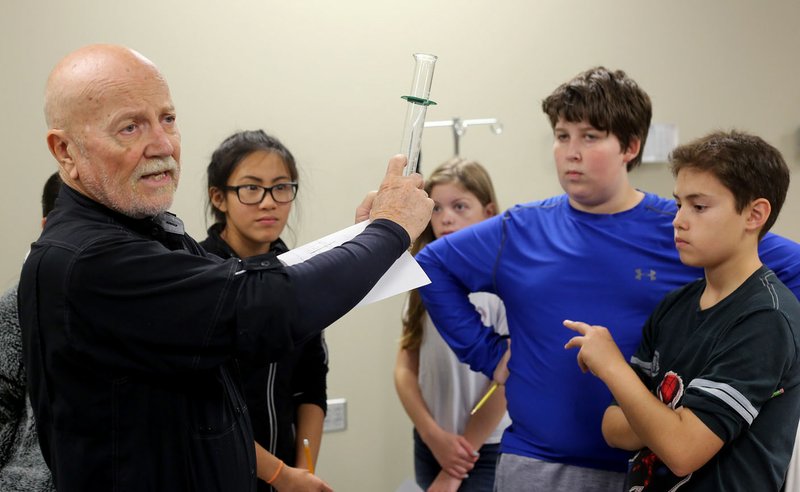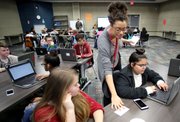SPRINGDALE -- The seventh-graders at Don Tyson School of Innovation are settling into a new grade and so is the school.
The school opened in 2014 for eighth-graders, and grades were added each year, now going up to the 11th grade. This fall, 77 students are enrolled in the first seventh-grade class at the school that bases its curriculum on science, technology, engineering and math. The school will add sixth and 12th grades next fall.
Seventh-grade pilot
The Tyson School of Innovation focuses on accelerated learning, striving to create college and career opportunities for students while completing high school, according to its website. This is the first year the school has offered seventh grade and will add sixth grade in next year.
Seventh-grade academic programs
• STEM, or environmental and spatial technology, instruction in math and science
• Humanities instruction in English and social studies
• Spanish immersion for non-native speaker
• Spanish for native speakers with culture and communication connection
Seventh-grade program of studies
• EAST
• Engineering
• Robotics
• Drones
• Urban agriculture
• Medical arts
• Computer science
• Visual art
• Theater
Source: Staff report
The School of Innovation is a technology-rich STEM -- science, technology, engineering and mathematics -- school that embraces a flexible and blended learning style to promote student success, according to the school's webpage. It's a conversion charter school, meaning it's run by the School District.
"We want our seventh and eighth grades to serve as a sort of orientation to what the rest of their high school experience can look like," Principal Joe Rollins said. "With seventh grade, we really want to start working on collaborative and executive skills: how do you work together, how do you manage time, how do you learn to be responsible. Then, we really start to have some conversations about what is your personal goal for being here."
Enrollment is first come, first served, Rollins said, and they want to keep it about 100 students each in sixth and seventh grade. The additional lower grades will minimize the transition to the faster paced and project-based learning environment. He said this earlier adjustment will lead to a stronger school culture.
Transitions
Tamara Thiam, seventh-grade English and social studies teacher, said it's been a transition from an elementary mindset into an attitude of self-responsibility earlier than students would face in a traditional classroom.
"It's really been a culture shock for them, having to take so much responsibility for their own learning," she said. "But I think, they are doing pretty well by now."
The seventh-graders are in one "zone" or large room, which is divided into different classrooms but doesn't have a physical barrier separating them. Some students said this was distracting at first.
"At my other school, we were very organized and having one big zone is very different. But you definitely get used to it after a while, and it forces you to pay more attention," student Mary Blake Martfeld said.
Ethan Coffman said he wanted to go to the school for a while and jumped at the opportunity this year. He's interested in 3D printing, math and possibly engineering, he said.
"It's got a lot more opportunities here, and now I also don't have to switch schools once I get into high school," Ethan said. "It's more advanced, so I'm not sitting in a classroom bored all day because I'm ahead. Each day we do different things and switch it up."
Mary said she enjoys the project-based classes over tests, because it's more fun and she absorbs more information through writing and presenting ideas versus just studying. She said she is still deciding if she wants to continue at the school, with her only concern being athletics.
The school was granted eligibility from the Arkansas Activities Association in late October and will be offering cross country, lacrosse and tennis next school year. Students interested in sports not yet offered, such as football, can participate on teams at the school whose zone they live in, Deputy Superintendent Jared Cleveland said.
The school is trying to foster culture and opportunity by expanding the arts next year. Rollins is increasing the music, drama and fine art staff to become not just a STEM school, but a STEAM school -- science, technology, engineering, art and math, Cleveland said.
Plans are in motion to expand the building along with the student body. The school is built to hold 1,000 to 1,200 students. It has 776 enrolled.
"Now at year four we are in a position, due to interest and due to growth, we are ready to continue expanding that building," Rollins said.
The school is getting $15 million from the state for phase two of construction, which could cost $30 million to $35 million. Officials are planning to add 150,000 square feet or more to the 143,000-square-foot facility.
The additions are in the planning stages, and officials were hesitant to provide specifics as plans likely will change. Cleveland and Rollins stressed the importance of community partners with the building process as well as the school's academic structure.
"We have industry and business leaders coming in all the time saying 'What can we do to help? We like this.' It's awesome," Cleveland said. "And one of these days, when you see a drawing of the facility, it will have the fingerprint of all our business and industry leaders around this region."
Plans should be solidified in April so bidding can happen in May or June, Cleveland said.
The additions will need to be flexible, because what works this year, may not work a few years down the road, Cleveland and Rollins said. For example, labs are used by several types of classes.
"We know that the need to adapt is a certainty. In talking with business, community partners, they tell us that change is ongoing," Rollins said. "We are trying to build a building and lab spaces that can be responsive to that need. We will cover major employment needs for this region within these labs."
The school offers environmental and spacial technologies, pre-engineering, construction trades, computer science, alternative agriculture, diesel technology and medical professions.
More space is planned for skilled trades such as diesel mechanics, manufacturing, metal fabrication, business and entrepreneurship, animal science and plant science, Rollins said. These are all possibilities right now, he said.
Flexibility
For each grade, the model has to be implemented a little differently.
Cleveland said as long as most colleges stay confined to the typical lecture and deadline format, some School of Innovation students will require standard, pre-college experience to be properly prepared. The school's goal is to prepare students for the future, whether that's college or straight into the workforce, he said.
Sophomore Abby Herrera has been at the school since eighth grade and said she loves that it allows her to be as ambitious as she wants. Teachers don't roll their eyes and tell her to just do her work when she declares she wants to be president, or maybe an engineer. She has time to decide.
"They accept my goals and give me a realistic path to work toward them," she said.
After years of the flexible scheduling, Herrera said it was an adjustment starting her first Advanced Placement classes this semester.
"It took a lot more from me to meet those deadlines," she said about her AP classes. "I think rather than hurting me, it's allowed me to be a better student and adapt to different course work."
The school is partnering with Northwest Arkansas Community College in Bentonville to teach college courses and offers many AP courses. Students could potentially graduate with an associate's degree at the same time they graduate high school, Cleveland said.
Science teacher Floyd Watson has been teaching in Northwest Arkansas since 1967. He retired in 2007, but returned to teach at the School of Innovation. The school fits the hands-on approach he has always taken.
Thiam is a first-time teacher and was excited to take the job.
"The world of education is pushing toward this self-paced, project-based mentality. So I was like, 'I'd like to be part of a movement like that and jumpstart my career,'" she said.
Watson has taught all age groups and sees this school attempts to reach each child at his level and challenge him.
"It will be an amazing school because they are allowing innovation to occur," he said. "I think that eventually this place will be the icon of the area."
NW News on 11/19/2017


